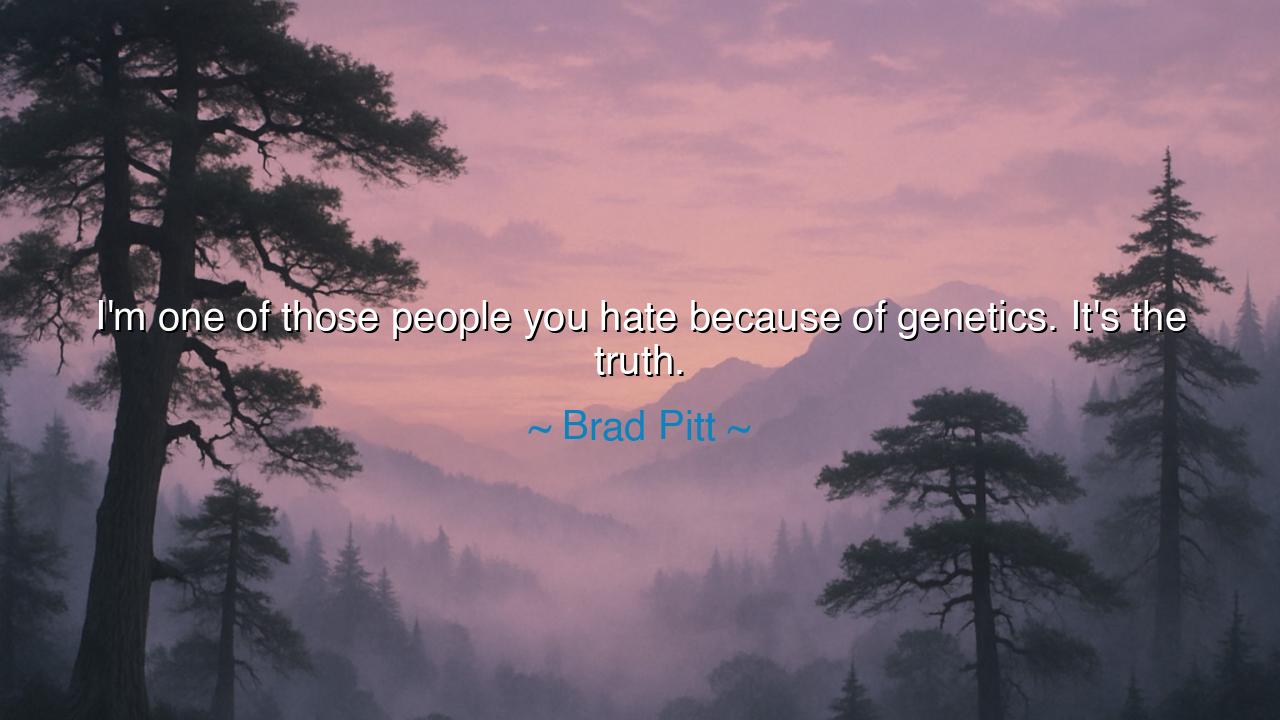
I'm one of those people you hate because of genetics. It's the






The words of Brad Pitt—“I’m one of those people you hate because of genetics. It’s the truth.”—though spoken with humor and humility, reveal a truth both sharp and timeless: that men and women are not born into equal circumstances. Some are endowed by nature with beauty, strength, or talent, while others must labor for every scrap of recognition. Pitt, famed for his appearance, acknowledges that his fortune in genetics brought him admiration and envy alike. Yet beneath the jest lies a deeper reflection on the cruelty of fate, the vanity of appearances, and the strange burden carried by those who are favored by nature.
For history has long shown that men envy what they cannot claim. The Greeks praised the beauty of Helen, yet also cursed it, for her face brought war and ruin upon nations. The Romans admired Caesar’s genius and fortune, yet conspired to end his life, for his gifts stirred jealousy in lesser men. Beauty, talent, and good fortune are double-edged: they bring worship from some, but hatred from others. Pitt’s words, though light, unveil the eternal paradox—those blessed by nature often walk in shadows of resentment, for others measure themselves against them and burn with bitterness.
Yet this is not new. The ancients saw that fortune—whether in birth, in wealth, or in power—was not earned but given. And what is given can stir envy far greater than what is achieved. For labor inspires respect, but gifts inspire resentment. A man who becomes mighty through toil is admired, but one who is born mighty is envied. Thus Pitt’s acknowledgment—“it’s the truth”—is not arrogance, but resignation to this ancient reality: that the world is quick to scorn what it also praises.
We may find echoes of this in the story of Alexander the Great. Gifted with charisma, beauty, and the brilliance of conquest, he was adored by his soldiers yet despised by rivals who envied his glory. Even his closest companions sometimes turned against him, for his gifts seemed too overwhelming, too unfair, as if the gods themselves had favored him. His life demonstrates that fortune bestowed by nature carries a price: love mixed with hate, worship laced with envy.
But there is wisdom for the ordinary soul as well. Each of us, whether blessed with beauty, wealth, or talent—or burdened by their absence—must learn to see that genetics and fate do not define the measure of a life. What truly matters is not what one is given, but what one does with those gifts or limitations. Beauty fades, strength diminishes, but character, humility, and kindness endure. Envy arises when we measure ourselves against others; peace is found when we labor to cultivate our own virtues.
The lesson, then, is this: do not despise those whom fortune has favored, nor worship them. Instead, recognize the impermanence of such gifts and the higher value of the soul. And if you are blessed with abundance—be it beauty, wealth, or power—carry it with humility. Use it not to elevate yourself over others, but to serve, to uplift, to show gratitude to the Source from which all gifts flow. For envy consumes, but gratitude sanctifies.
Therefore, O seeker, remember Brad Pitt’s light yet weighty words: genetics may grant blessings, but they do not define the worth of a life. Envy poisons the heart, while humility and kindness redeem both the gifted and the overlooked. Do not hate another for what they were given. Instead, honor your own path, cultivate your own strength, and build your own legacy. For in the end, what endures is not the fleeting favor of nature, but the eternal work of the spirit.






PTHuynh Phu Thinh
I find this quote interesting because it brings up the complexity of physical beauty and societal expectations. Brad Pitt seems to acknowledge that his good looks are due to genetics, but does that mean he has to apologize for them? It’s frustrating that people are often judged based on appearance. Is it time we rethink the way we value people, focusing more on inner qualities rather than genetic lottery?
HNHuyen Nguyen
Brad Pitt’s comment is a bit of a double-edged sword. On the one hand, he’s acknowledging the reality that some people may resent him for having favorable genetics. On the other hand, it makes me wonder: can anyone truly take credit for their physical appearance? How do we balance the idea of working hard to achieve things with the fact that some aspects of life are beyond our control, like our genetic makeup?
TTphan cong truyen thong
This quote seems to encapsulate Brad Pitt’s awareness of the role that genetics play in how we are perceived. It’s interesting that he mentions it with such honesty. But what’s the real issue here—why does society place so much value on someone’s genetic makeup? Shouldn’t we be more focused on a person’s character, achievements, and actions rather than something as superficial as appearance?
VNVu Nguyen
Brad Pitt’s admission here seems to reveal a lot about how society values physical appearance. He’s aware that some people might resent him for it, yet he seems to accept it as part of his identity. How do you think people should navigate the balance between accepting their advantages and being humble about them? Can someone be celebrated for their looks without it leading to envy or resentment?
NTThi thuy ngan Truong
This quote feels like a moment of self-deprecating honesty. Brad Pitt is acknowledging how genetics play a big role in how people perceive him, but it also brings up the idea of genetic privilege. Is it really something to be hated, or should we embrace the reality that everyone has advantages? What does this say about society’s obsession with beauty and how we assign value to it?